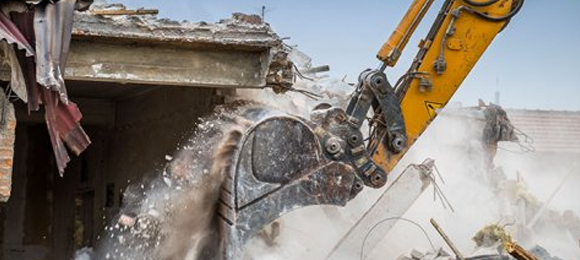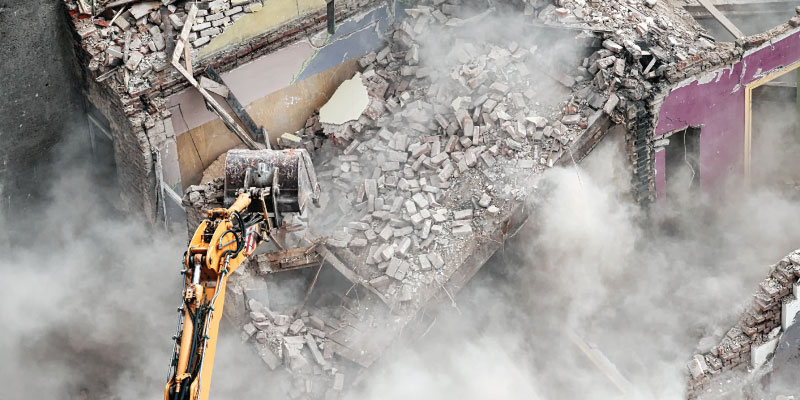
Updated October 13, 2023
When thinking about tearing down a house, it’s important to understand the process behind it—not only the physical demolition but what should happen in the planning stages, too.
We'll outline the house demolition process from start to finish so you know what to expect and where to start.
Jump to:
- Hire the Right Contractor
- House Inspection
- Shut Off Utilities
- Salvage What You Can
- House Demo Process
- Debris Disposal
Find house demolition contractors near me

Hire the Right Contractor
The first, and arguably the most important, step in the house demolition process is finding a qualified, reliable contractor.
The house demolition contractor you hire should have the heavy equipment needed to tear down a house safely and efficiently, and be licensed in your area to do so.
Your contractor should come with positive reviews from other customers, preferably someone you know and trust, and be appropriately licensed and insured.
Luckily, Hometown can help you find local, licensed, and insured house demolition contractors in your area. We publish reputable demolition companies across the U.S. to help connect consumers with licensed and experienced contractors that are able to accommodate their demolition projects.
By entering your zip code and answering a few short questions about your demolition project, you'll be shown house demolition specialists near you that will provide completely free project estimates.
Ideally, you should get quotes from 2-3 contractors at minimum to ensure you choose the best person for the job. Multiple house demolition estimates will ensure you get the best price, best service, and the availability your project requires.
Whether you speak with one contractor or many, you will want to get an estimate or job proposal in writing before making any sort of commitment.
Because a contract is legally binding, make sure you are satisfied with what it entails before moving forward. If you have any questions at all, ask your contractor to clarify it, both verbally and in writing.
At the very least, your written contract should include the following:
Project Details
- A detailed description of the project, including the extent of the work, the equipment and materials that will be used, as well as who will be working at and/or supervising the job site
- Project start date and estimated date of completion (If your project is extensive, outline completion dates for each stage of the project.)
- Whose responsibility it is to pay for and pull permits for performing the work (if necessary)
- Protocol for handling any changes that may arise, whether due to change orders, unforeseen issues, or cancellations
Payment Schedule
- A cost estimate and the work/materials included
- A clear-set schedule for payment (Ideally, you will pay a small percentage of the overall price upfront, and then you will pay for the work as it is completed.)
Before signing a contract...
- Did you thoroughly research this company and determine they are qualified to do this work to your expectations?
- Does this contractor clearly understand your vision, budget, and timeline for this project, and is this information explicitly outlined in the contract?
Learn more:
- How to Request Demolition Quotes with Hometown
- Licensed vs Unlicensed: Why It's Important to Hire a Licensed Contractor
- How to Be Sure You’re Hiring the Best Contractor
Get the House Inspected
Before demolition, the house should be inspected for hazardous materials like asbestos and lead paint. If there are hazardous materials present, the proper remediation protocol needs to be followed.
Failing to remove any hazardous material present in the home prior to demolition can result in additional fees, fines, and/or penalties.
Additionally, it also puts you, your neighbors, the workers, and local wildlife at risk of harmful exposure which can result in longterm health effects like mesothelioma.
Keep reading: How to Safely Remove Hazardous Wastes Before a Remodel or Demolition Project
Shut Off Utilities
Contact your utility providers—gas, sewer, water, and electric—and have everything disconnected before demolishing anything. This is required regardless of where you live or if the property is public or private.
Depending on where you life, the local department or other authority may need to perform an inspection specifically to ensure all utilities are properly disconnected before house or building demolition can begin.
Salvage What You Can
If you have salvageable materials in your home, work with your contractor to reclaim them. They can help you recover anything that could be donated, resold, or recycled before tearing down the rest of the house.
Salvageable items could include:
- Bathroom and/or kitchen cabinets
- New carpeting
- Hardwood flooring
- Countertops
- Historically valuable doors and/or windows
Find house demolition specialists in your area
House Demolition Process
The physical act of tearing down a house can take anywhere from a single day to multiple days to complete.
The two most common ways to demolish a house are either traditional, mechanical demolition with the assistance of heavy equipment, like a hydraulic excavator, or by tearing down the house by hand, commonly known as deconstruction.
Traditional Mechanical Demolition
Mechanical demolition is the most common method of house demolition. It involves ripping the house down with the help of hydraulic excavators and other heavy equipment.
Deconstruction
Deconstruction is the process of manually stripping and taking apart the house piece-by-piece to salvage as many of the materials inside the home as possible. Deconstruction is often considered the most eco-friendly way to demolish homes and large buildings, but it usually takes longer and costs more.
Another option is a combination of these two methods—partially deconstructing your home by hand and then having the rest of the house demolished with an excavator. This would be the method of choice if there are aspects of your home that you'd like to salvage and in some cases, can even save on costs.
Dispose of the Debris
Any resulting debris is loaded into a dumpster and hauled away to the nearest landfill or recycling facility.
This is usually taken care of by your demolition contractor, but if for some reason you've entered an arrangement where you would be responsible for the resulting house demolition debris, you'll either way to rent a dumpster or hire a debris removal crew to take care of it for you. Our sister site, Hometown Dumpster Rental, can help you find locally-owned and operated dumpster rental and junk removal companies that can haul away and dispose of your debris.
All debris should be removed from the site so that it is clean and ready for the next steps, which usually involves grading to make the land ready for new construction or ready for a property sale.
Whether you plan on just laying grass at the blank site or building a new house, your demolition contractor will generally use the same equipment to prepare the land as they did to tear down the house. When possible, use your demolition contractor to grade and prepare for what comes next to save both time and money.
Search for qualified house demolition and land grading contractors in your area by searching on Hometown. Get answers to common demolition questions, read verified reviews from real customers, and get free quotes to make the best choice for your project.
Find a house demolition contractor near you
Continue reading about house demolition:


